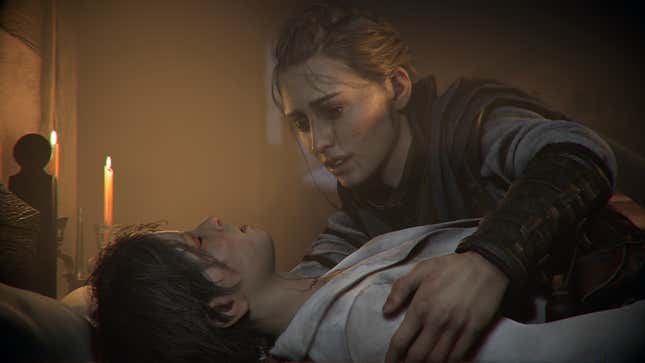
Often, when I’m walking through Brooklyn, the sweating black garbage bags on the sidewalk start moving. There’s a pattering sound coming through the plastic. Then a fat pink tail or a snout pops out, or there’s a flash of matted, greasy gray fur and I yelp with recognition: it’s a fucking rat.
There is no creature on the planet I detest more than the fucking rat. We cross paths throughout the day and used to share an apartment, despite the rats, to my knowledge, lacking the technology to use a rent portal. But no matter how much rat exposure I get, how often my friends implore me to rebrand the tottering mini-monsters as “cute,” just hearing their familiar rustling is enough to fill my, I like to think, somewhat tender heart with acute murderous intent. So in that sense, A Plague Tale: Requiem is the perfect game for me.
The sequel to 2019’s stealthy, grisly puzzle game A Plague Tale: Innocence, Requiem delivers similar moral quandaries to the original while switching its still formidable voice actors’ accents from French to British. The Hundred Years War and its consequences, I guess.
Again, players must guide siblings 15-year-old Amicia and five-year-old Hugo through 14th century France as its overrun with swarming, humming, rumbling tectonic plates of diseased rats, rats Hugo can control with the Prima Macula turning his veins purple, quickly destroying his tiny body. Six months after the first time, just when the de Rune family thought it was time for them to be happy.
Now, as Hugo’s condition worsens and rats wipe out even more of France, it’s time to find a cure. Like Innocence, where players led the siblings around members of the Inquisition out for their noble blood, you hunt for a cure through a combination of sneaking around soldiers and rats, crafting useful powders and explosives with alchemy, and landing headshots with Amicia’s trusty sling. But Requiem expands on and deepens the satisfaction of these options.
The environment itself is a spectacle, a black-and-white cookie sometimes lit by the Mediterranean coast’s burnt-orange sun, sometimes spotted with flies as Amicia trudges around the game’s stacks of dead bodies that get dumped and burned and forgotten. Requiem is also heavy on vibration feedback, and crouching through thick braids of grass and the misplaced brightness of lavender always feels good and tense.
As the game progresses, you’ll graduate from avoiding either the soldiers hunting Amicia, who has made the jump from regular girl to completely homicidal, or the hairy whirlpools of rats that fear light and fire, to both. The combination requires different kinds of thinking depending on the companion you have with you. The alchemy apprentice Lucas, for example, walks Amicia through creating fire, snuffing it out, or guiding rats where she wants them through a combination of found chemicals and weapons, including the lethal girl’s newly acquired crossbow. Other characters like Arnaud, a hulking bearded soldier, can attack on your behalf, and Hugo’s connection with the rats has strengthened so that not only can he guide them, but he can also see from their yellowed perspective and take enemies down quickly.
Slinking around soldiers, rats, or soldiers and rats gets a little tired once you’ve made it through 15 hours of Requiem’s more than 20 hours of playtime like I have—there are only so many materials to collect, torches to snuff out, and chattering knots of rats to avoid until you pretty much get the idea.
Though the puzzles are repetitive, I was pleased with myself everytime I made it through a particularly dense problem or one of the game’s confusing “boss” scenes, where Amicia somehow manages to take down scores of javelin-carrying, armored men with a few pebbles and arrows. Solving the Requiem’s puzzles often feels rewarding, as completing any decent puzzle should, but too much of that gratification comes from the fact that there were so many bugs on PS5. When I finally managed to avoid them, I wanted to celebrate.
The bugs, the bugs! Like I said earlier, I am a one hundred percent genuine rat hater, but Requiem approaches rats in a way that is so disgusting—thousands form a shaking puddle over unlit grounds, they burst through stone buildings and collapse ceilings and smother everything in an unwanted hug—that they command respect. And, as Amicia grows colder, hardened by the callousness of men, the futility of her family’s situation, the buzzing rat carpet provides sickly motivation to keep killing, keep standing by her fragile brother with his inhuman power.

The rats gave me noxious pleasure. It was like seeing a friend from high school on TV. But the current bugs, still annoyingly persistent even after downloading the game’s day one update, ruin it too often.
I can take the rats, but there are possibly too many for a next generation console to handle. One frustrating issue that often chewed up my playtime was the rats going where they were not supposed to be. Rats wandering under torches and immediately killing Amicia. Rats suddenly materializing in lit stairways and immediately killing Amicia. Rats that won’t move even when I cracked an exploding jar of fire over their heads. Again, immediately killing Amicia.
And, on two occasions, my NPC companion refused to move and let me get to the next part of the game. I’m still stuck on one of those occasions. I haven’t been able to progress in Requiem since last night, because no matter how many times I restart my console or my save file or rewrite it, Arnaud keeps walking into a wall. I can’t leave the rat infested cave I’m in without him, because the game won’t let me. I can’t stay, either, because there is nothing else to do except be eaten by rats. But Arnaud keeps walking into a wall.
Requiem’s buggy moments distracted me from what is otherwise a stunning and plaintive game about love, health, and crumbling faith. Amicia’s seesawing ideals, tipping always between blind rage toward a government that responds to sickness with apathy and grown-up guilt for not giving more of herself to her family that’s already demanded so much, touched me and reminded me of the moral questions I grappled with while navigating our own 21st century pandemic.
“This world hurts. And it keeps hurting. And you want to hurt it back,” Lucas tells Amicia in one of her darker moments, after she feels sweaty, like she’s going to collapse. “But you are not them.”
The game’s gorgeous score, a heart squeezed by shipwrecked strings, accentuates these moments of understanding between myself and Amicia, two older sisters with choices to make. My choices, thankfully, rarely involve running away from rat tidal waves my sibling spawned, but still, I run from them when they shimmy out of the garbage bags. I get it. I want to spend more time in Amicia’s flattened home while I process mine. But the bugs, sadly, won’t let me.

